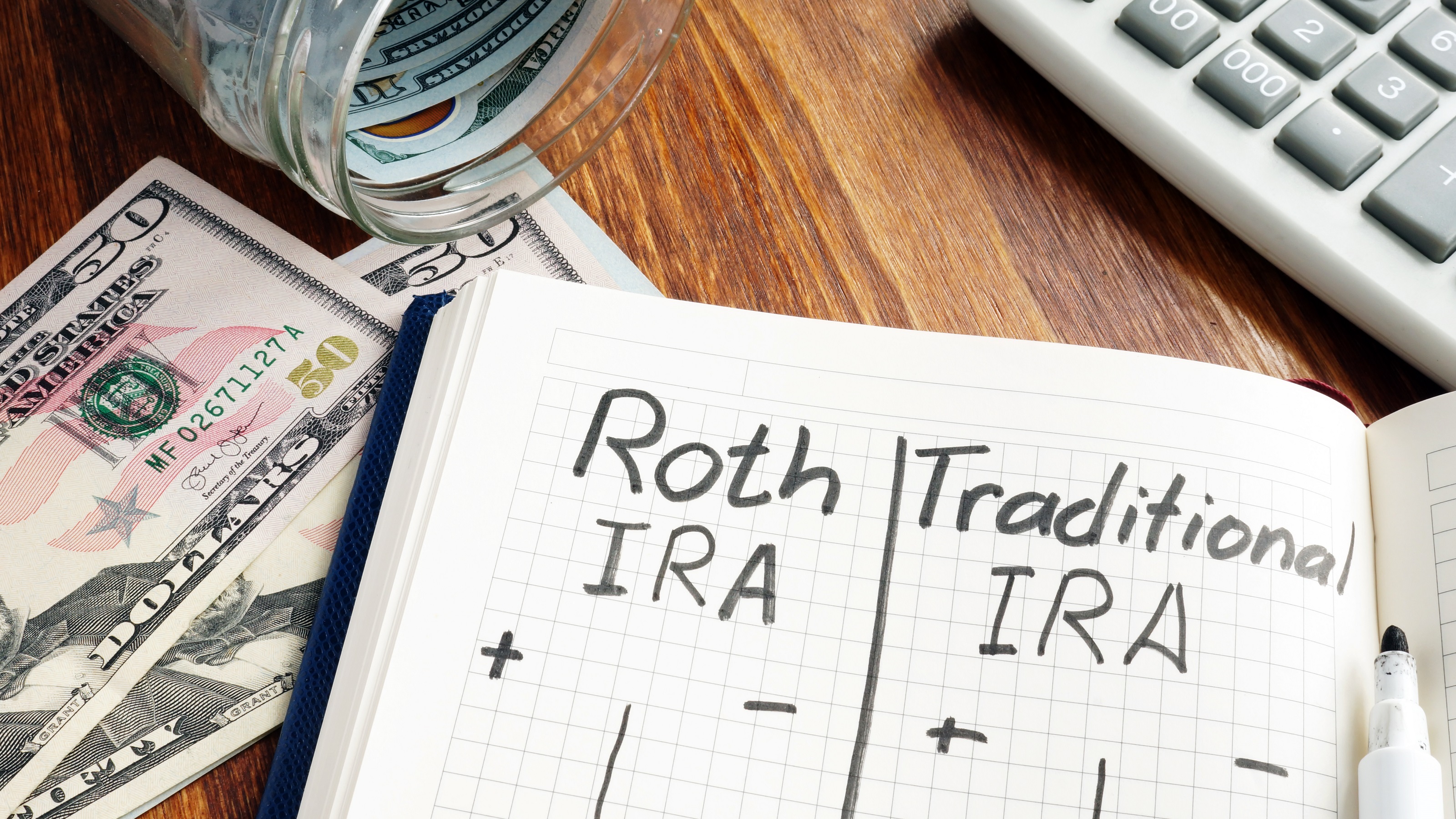Roth or Traditional: How to Choose a Retirement Tax Strategy
When picking which type of 401(k) or IRA is right for you, consider whether you want to save a little on your taxes now — or save a lot more on them later.


Profit and prosper with the best of Kiplinger's advice on investing, taxes, retirement, personal finance and much more. Delivered daily. Enter your email in the box and click Sign Me Up.
You are now subscribed
Your newsletter sign-up was successful
Want to add more newsletters?

Delivered daily
Kiplinger Today
Profit and prosper with the best of Kiplinger's advice on investing, taxes, retirement, personal finance and much more delivered daily. Smart money moves start here.

Sent five days a week
Kiplinger A Step Ahead
Get practical help to make better financial decisions in your everyday life, from spending to savings on top deals.

Delivered daily
Kiplinger Closing Bell
Get today's biggest financial and investing headlines delivered to your inbox every day the U.S. stock market is open.

Sent twice a week
Kiplinger Adviser Intel
Financial pros across the country share best practices and fresh tactics to preserve and grow your wealth.

Delivered weekly
Kiplinger Tax Tips
Trim your federal and state tax bills with practical tax-planning and tax-cutting strategies.

Sent twice a week
Kiplinger Retirement Tips
Your twice-a-week guide to planning and enjoying a financially secure and richly rewarding retirement

Sent bimonthly.
Kiplinger Adviser Angle
Insights for advisers, wealth managers and other financial professionals.

Sent twice a week
Kiplinger Investing Weekly
Your twice-a-week roundup of promising stocks, funds, companies and industries you should consider, ones you should avoid, and why.

Sent weekly for six weeks
Kiplinger Invest for Retirement
Your step-by-step six-part series on how to invest for retirement, from devising a successful strategy to exactly which investments to choose.
More people than ever are choosing to retire early, kick their feet up and enjoy their golden years. One in eight workers hopes to retire before they turn 61. However, that requires building a comfortable financial situation to survive 20, 30 or even 40 years of retirement.
That’s why choosing the right type of retirement strategy is vital to setting yourself up for financial success in your golden years. One of the biggest complaints I hear from retirees is that their taxes are too high. Tax expenses don’t end when you retire, but proper planning can help minimize your tax burden when you’re ready to use your money. Whether it’s an employer-sponsored 401(k) plan or an IRA, the choice between a traditional and Roth retirement plan requires a thoughtful approach.
It’s important to take a holistic view of your retirement fund throughout your whole life for efficient financial planning. Your ultimate goal: Maximizing your retirement fund while paying only the taxes you should owe.
From just $107.88 $24.99 for Kiplinger Personal Finance
Become a smarter, better informed investor. Subscribe from just $107.88 $24.99, plus get up to 4 Special Issues

Sign up for Kiplinger’s Free Newsletters
Profit and prosper with the best of expert advice on investing, taxes, retirement, personal finance and more - straight to your e-mail.
Profit and prosper with the best of expert advice - straight to your e-mail.
How can you minimize taxes in retirement?
There is one clear difference between Roth IRAs and Roth 401(k)s and traditional IRAs and 401(k)s: when you pay taxes on your contributions. Traditional retirement savings plans are tax-deferred, meaning any contribution you make will be tax-free — until retirement. Once the retiree starts withdrawing money, they must pay taxes on every dollar of that money. In addition, traditional accounts have required minimum distributions (RMDs), forcing you to make a minimum annual withdrawal based on how much money is in the account. This increases your taxable income.
The starting age for RMDs keeps rising — it rose from the original age of 70½ to age 72 five years ago, then to the current age of 73 and finally will creep up to age 75 in 2033 — but just know that the day will come that you’ll have to pay the piper.
Compare that with a Roth account, where contributions are taxed when they are made. While you don’t get an immediate tax break, when the money is ready to be used in retirement, it will be available to you 100% tax-free. Plus, Roth accounts don’t have RMDs.
The benefit of pre-tax contributions in traditional accounts is they lower your taxable income in the year you make them. Common wisdom used to tell workers to take advantage of pre-tax contributions. However, by delaying the tax bill until retirement, many retirees are spending more tax dollars later in life after seeing their account values grow.
So, paying taxes on Roth contributions today can lead to a smaller lifetime tax bill than you would have if you deferred taxes until retirement by contributing to a traditional account.
The big picture
It’s easy to view a tax bill on an individual year-by-year basis. However, our goal should be to pay no more taxes than necessary over our lifetime. Unless Congress takes action, the Tax Cuts and Jobs Act will sunset at the end of 2025, which could lead to tax increases for many Americans. Regardless of whether it is extended, most financial professionals expect taxes to increase in the future.
People often consider only which tax brackets they might be in at retirement rather than considering what their overall tax bill will be. Good planning should be based on what we know today: We invest to grow our account balances. Regardless of the tax bracket, higher account balances in tax-deferred accounts will lead to more taxes in retirement.
Diversifying your retirement accounts today could be an important tool for determining how those assets are held and used in retirement. One example is Roth 401(k)s, which are increasingly offered as part of employee benefit packages. They provide benefits beyond just not having RMDs and not having to pay taxes on distributions. They also give you a pool of retirement money you can draw from in emergencies without adding to your taxable income.
However, although 80% of employer-sponsored retirement plans offer a Roth option, only 17% of Americans took advantage of them, opting instead for a traditional account. Many employers offer a pre-tax match on 401(k) contributions up to a specified percentage, and employees who contribute to a Roth also can receive the match (because it is pre-tax, it would go into a traditional 401(k) account).
For many, contributing more heavily to Roth accounts can lead to a lower lifetime tax bill than sticking only to traditional 401(k)s and IRAs. Rarely do retirees complain about having too much tax-free money. Depending on your unique situation and your employer match, it may make sense to contribute to a traditional retirement account, its Roth counterpart, or both.
There can be benefits to diversifying your assets with both types of retirement accounts. The decision requires a detailed look at your financial situation. When choosing how to approach Roth and traditional accounts in your retirement strategy, work with a financial adviser who is familiar with your individual financial picture and goals.
Related Content
- Traditional Retirement Accounts or Roth? How to Choose
- Roth 401(k) Contribution Limits for 2024 and 2025
- Plan Now, Save on Taxes Later: Tax Law Reset Is Coming
- Gen X: We Need to Talk About Your Retirement
- Three Often-Overlooked Ways to Cut Your Tax Bill Now
Profit and prosper with the best of Kiplinger's advice on investing, taxes, retirement, personal finance and much more. Delivered daily. Enter your email in the box and click Sign Me Up.

As the founder and CEO of Momentum Wealth, Nico Pesci is passionate about creating efficient retirement plans and helping clients adapt to volatile economic environments. After watching his parents struggle to keep their retirement savings during the 2008 financial crisis, Nico founded Momentum Wealth to help people like his parents build the confidence they need to enjoy the retirement they deserve.
-
 Nasdaq Leads a Rocky Risk-On Rally: Stock Market Today
Nasdaq Leads a Rocky Risk-On Rally: Stock Market TodayAnother worrying bout of late-session weakness couldn't take down the main equity indexes on Wednesday.
-
 Quiz: Do You Know How to Avoid the "Medigap Trap?"
Quiz: Do You Know How to Avoid the "Medigap Trap?"Quiz Test your basic knowledge of the "Medigap Trap" in our quick quiz.
-
 5 Top Tax-Efficient Mutual Funds for Smarter Investing
5 Top Tax-Efficient Mutual Funds for Smarter InvestingMutual funds are many things, but "tax-friendly" usually isn't one of them. These are the exceptions.
-
 Nasdaq Leads a Rocky Risk-On Rally: Stock Market Today
Nasdaq Leads a Rocky Risk-On Rally: Stock Market TodayAnother worrying bout of late-session weakness couldn't take down the main equity indexes on Wednesday.
-
 Quiz: Do You Know How to Avoid the 'Medigap Trap?'
Quiz: Do You Know How to Avoid the 'Medigap Trap?'Quiz Test your basic knowledge of the "Medigap Trap" in our quick quiz.
-
 5 Top Tax-Efficient Mutual Funds for Smarter Investing
5 Top Tax-Efficient Mutual Funds for Smarter InvestingMutual funds are many things, but "tax-friendly" usually isn't one of them. These are the exceptions.
-
 Why Invest In Mutual Funds When ETFs Exist?
Why Invest In Mutual Funds When ETFs Exist?Exchange-traded funds are cheaper, more tax-efficient and more flexible. But don't put mutual funds out to pasture quite yet.
-
 We Retired at 62 With $6.1 Million. My Wife Wants to Make Large Donations, but I Want to Travel and Buy a Lake House.
We Retired at 62 With $6.1 Million. My Wife Wants to Make Large Donations, but I Want to Travel and Buy a Lake House.We are 62 and finally retired after decades of hard work. I see the lakehouse as an investment in our happiness.
-
 Social Security Break-Even Math Is Helpful, But Don't Let It Dictate When You'll File
Social Security Break-Even Math Is Helpful, But Don't Let It Dictate When You'll FileYour Social Security break-even age tells you how long you'd need to live for delaying to pay off, but shouldn't be the sole basis for deciding when to claim.
-
 I'm an Opportunity Zone Pro: This Is How to Deliver Roth-Like Tax-Free Growth (Without Contribution Limits)
I'm an Opportunity Zone Pro: This Is How to Deliver Roth-Like Tax-Free Growth (Without Contribution Limits)Investors who combine Roth IRAs, the gold standard of tax-free savings, with qualified opportunity funds could enjoy decades of tax-free growth.
-
 One of the Most Powerful Wealth-Building Moves a Woman Can Make: A Midcareer Pivot
One of the Most Powerful Wealth-Building Moves a Woman Can Make: A Midcareer PivotIf it feels like you can't sustain what you're doing for the next 20 years, it's time for an honest look at what's draining you and what energizes you.